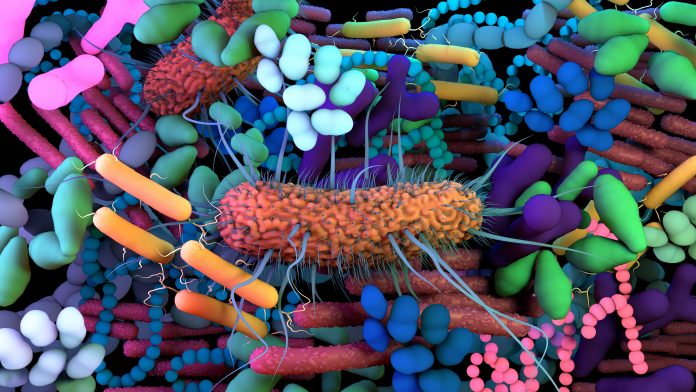
A U.K. and Swiss study suggests that our immune system does not simply shape our microbiome, but that our microbiome also shapes our immune system.
The research in fruit flies, published in Science, supports the idea that specific host immune genes have been tailored or selected for to deal with specific microbes.
It provides a window on how the immune repertoire adapts to the changing environment of viruses, bacteria and fungi that live in and around an organism.
Researcher Mark Hanson, PhD, from the University of Exeter, said it was already known that an animal’s food and environment determined the bacteria it encounters.
“This in turn shapes its ‘microbiome’—the collection of microbes that live in and on its body —and our study shows how immune systems evolve in response to this, to control common bacteria that could otherwise cause harm,” he explained.
“In immune terms, it proves the saying ‘you are what you eat’—the flies’ immune systems contain peptides with remarkably specific functions for controlling common bacteria.”
Organisms produce many front-line defenses to ensure beneficial microbes remain while preventing infection from harmful pathogens. Chief among these are antimicrobial peptides, which are small, host-encoded antibiotics that combat invading microbes.
While many studies have shown important roles for these peptides in regulating the microbiome, it is currently difficult to understand why the genomes of animals encode a particular repertoire.
In the current study, Hanson and co-workers found that two related antimicrobial peptides, Diptericins A and B, had evolved to specifically defend fruit flies against opportunistic infection by common environmental microbes.
The team found that different species of fly carried the Diptericin B peptide to control against Acetobacter, an acetic acid bacteria found in rotten fruit that can be harmful if it enters the insect’s bloodstream.
The flies displayed convergent evolution, with species that had diverged from a common ancestor approximately 100 million years ago each evolving Diptericin B to control the bacteria.
The convergent evolution provides a window on why some immune genes exist in their present form and indicates they are selected for in order to deal with microbes within the host’s environment.
Closely related fly species that do not feed on fruit had lost their Diptericin B peptides over time because Acetobacter is no longer commonly present in their environment.
The antimicrobial peptide Diptericin A, by contrast, is essential for defense against the common natural pathogen of fruit flies Providencia rettgeri.
A single residue in Diptericin (S69) is key to this defense, and it can be highly variable in wild flies.
The researchers believe that S69 may be selected for when the presence of this particular bacterium is high and is not maintained when its presence is low.
Diptericin A and S69 predicted more than 70% of variation in host defense, even across species.
“The way our bodies fight infections is really complex. But this sort of research helps us to view our immune system in a new light,” said Hanson.
“I hope it gets us to ask why our immune system is made the way it is. That can help us fight infections, including infections that resist antibiotics.”













